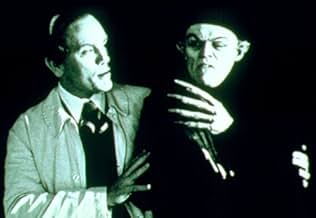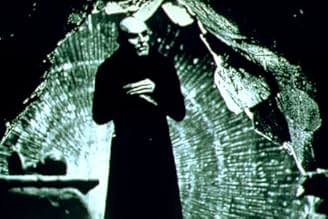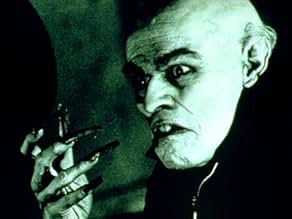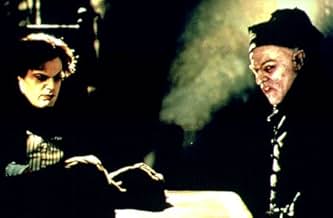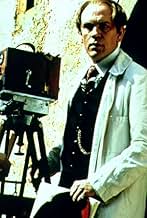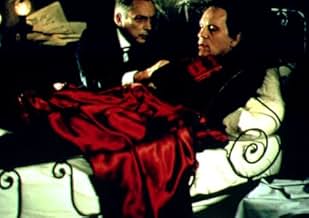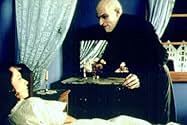El rodaje de Nosferatu (1922) se ve obstaculizado por el hecho de que su estrella, Max Schreck, se está tomando el papel de vampiro mucho más en serio de lo que parece humanamente posible.El rodaje de Nosferatu (1922) se ve obstaculizado por el hecho de que su estrella, Max Schreck, se está tomando el papel de vampiro mucho más en serio de lo que parece humanamente posible.El rodaje de Nosferatu (1922) se ve obstaculizado por el hecho de que su estrella, Max Schreck, se está tomando el papel de vampiro mucho más en serio de lo que parece humanamente posible.
- Dirección
- Guionista
- Elenco
- Nominado a 2 premios Óscar
- 16 premios ganados y 30 nominaciones en total
- Henrik Galeen
- (as John Aden Gillet)
- Paul - Camera Assistant
- (as Nicholas Elliot)
- Innkeeper
- (as Milos Hlavak)
- Drunken Woman
- (as Sacha Ley)
- Old Woman
- (as Marie Paule Van Roesgen)
- Dirección
- Guionista
- Todo el elenco y el equipo
- Producción, taquilla y más en IMDbPro
Opiniones destacadas
'Shadow of the Vampire' Synopsis: The filming of Nosferatu is hampered by the fact that the star is taking his role far more seriously than what seems humanly possible.
'Shadow of the Vampire' is a fictionalized account, so you shouldn't take this one too seriously. This Horror film, is creepy, atmospheric & yet funny. The Entire Story, The Entire Execution, in fact, is very convincing, even though, it won't work for the faint-hearted.
Steven Katz's Screenplay is superb. It's scary, creepy, atmospheric, funny & VERY innovative. E. Elias Merhige's Direction is as Eerie as it gets! Cinematography by Lou Bogue is fabulous. Editing by Royinba Onijala is crisp. Music by Dan Jones is good. Make-Up is Marvelous.
Performance-Wise: Willem Dafoe is Truly Magnificent, in an Oscar-Nominated Performance! His performance as Max Schreck, who plays Count Orlok/Count Dracula, is an astonishing embodiment, that's an Actor-Study. This is a Performance that deserves to be seen by each & every actor! John Malkovich as Frederich Wilhelm Murnau, is competent. Udo Kier as Albin Grau, is first-rate. Udo Kier as Albin Grau, is impressive. Catherine McCormack as Greta Schroeder, is worth a mention.
On the whole, 'Shadow of the Vampire' is an interesting film, but Willem Dafoe's Performance is its greatest merit.
The concept here is incredibly intriguing - what if a horror movie was a horror to film? Once the film kicks into gear, it establishes a rather creepy mood, especially in the sets, most of which mirror those of "Nosferatu" (the writer's bed, for instance, looks exactly like Hutter's).
As the film progresses, the actors take over the film, and it's interesting to see how they stack up to their precursors from 70 years ago. Eddie Izzard is an interesting Hutter (the Jonathan Harker analog), as (pretend) silent acting is well-tailored to his overbearing antics. Udo Kier is quite good as reserved producer Albin Grau. Alas, Cary Elwes, one of Hollywood's most underappreciated actors, is typecast as a kind of roguish, free-spirited Fritz Wagner, a real cinematographer (and the main one throughout all of "Nosferatu") and one of the stalwarts of German cinema into the 50's.
Malkovich is ideal for this role. He does a good job of being a manic, desparate for everything on his film to go right. His Murnau is a control-freak, a guy who keeps his crew in the dark, and adds to the generally creepiness.
The most curious thing about Murnau's "Nosferatu" is the vampire himself. The rest of the characters are pretty direct analogs of "Dracula". But instead of a suave, cool vampire of the Christopher Lee/Gary Oldman mold (later roles, of course), Murnau's vampire was a stiff, cold, violent monster. Willem Dafoe is absolutely brilliant in portraying this. He has some moments of comedic relief, bickering harmlessly with Malkovich, and generally being a fish out of water. Soon, however, his character becomes undeniably creepy, and Dafoe does a great job of making Count Orlok seem like the kind of guy who makes your skin crawl. In some way, this Orlok is less of a monster - he's portrayed a bit more sympathetically, sorrowing in his loneliness and never getting to see light. Murnau's vampire was almost always shot from below, making him appear huge and menacing; Dafoe's Orlok isn't monstrous so much as he just makes your skin crawl.
I do have a couple beefs, though, mainly technical. On a purely nitpicky level, Murnau is mentioned as a comtemporary of Griffith and Eisenstein, despite the fact that Eisenstein didn't make a movie until two years after "Nosferatu". On a less petty level, the characters seem a bit dumb. They have no problem accepting the fact that Orlok is an actual vampire once Malkovich tells them, but can't seem to figure it out on their own, despite seeing, among other things, Orlok pulling a bat out of the air and sucking the blood out of it.
The film, in general, does not end well. The penultimate scene is horribly contrived, a lot of silly reminiscing to to advance the plot a little. The ending itself isn't necessarily bad, just a bit ambigous. You don't come away with a clear sense of who (if anyone) was wronged amongst the main characters, and we leave a couple of them in limbo. A couple of technical details are odd, too. Murnau's Nosferatu has a shadow and a reflection, but this one only a shadow. Also, in the final scene they are supposedly filming, there's a wooden stake that's nowhere to be found in "Nosferatu".
A quick note, by the way - while the movie they are filming actually exists, rest assured the story is pure fantasy. Max Schreck went on to make more movies, as did the rest of the actors in this film, and no actors were bitten during the filming of the original movie.
A thououghly enjoyable film, especially if you're familiar with the subject matter.
I've never really been a big fan of Nosferatu nor a particular admirer of Willem Dafoe, but this bizarre little movie has made me appreciate both much more. A fictionalised account of the making of F.W. Murnau's 1922 silent horror classic, Shadow of the Vampire toys with the notion that Nosferatu's star Max Schreck (played here by Dafoe) was actually a bona fide member of the undead.
This fanciful idea plays out a little too slowly, perhaps, but offers plenty of opportunity for dark humour, the cast delivering suitably offbeat performances that prove strangely intoxicating, with Dafoe's mesmerising turn as Shreck being the film's strongest suit, the actor's mannerisms and expressions played to perfection.
Casual movie fans who haven't seen Murnau's classic will probably wonder what the hell is going on, so I recommend seeing Nosferatu beforehand, just so that one can fully appreciate the magic of certain scenes and the brilliance of Dafoe's performance.
Having assembled his crew, Murnau (John Malkovich) travels to a small town in Czechoslovakia, where he intends to recreate before his camera the story of Bram Stoker's "Dracula". Set on creating the most realistic vampire film, Murnau secretly recruits a real vampire (Willem Dafoe), promising to recompense the creature with leading lady Greta (Catherine McCormack). Murnau cautiously introduces the vampire to his producer Albin Grau (Udo Kier) and scriptwriter Henrick Galeen (John Gillet) as "Max Schreck", a truly professional "method actor" trained by Stanislavsky. Schreck performs his scenes suspiciously well, only appearing on the set at night and in character, keeping his end of the bargain with the director. Soon, however, his blood thirst takes over and he fearlessly threatens to eliminate, one by one, Murnau's most dispensable crew members.
Shadow of the Vampire stems from the premise that its protagonist, the fictional Murnau (Malkovich), must hire a real vampire in order to ensure a truly authentic representation of the vampire character, "Count Orlock", for his film Nosferatu. The viewer who seeks a more accurate portrayal of the making of the real Nosferatu may find this premise strained and far-fetched, and may even consider the film's ensuing humor a bit aimless. However, Shadow of the Vampire integrates the humorous premise to its metaphorical exploration of the artistic process and of the inevitable struggle between the star, the director and the crew. (In one scene, Schreck tries to secure his interests --a new victim-- by negotiating with Murnau. He reflects: "I don't think we need the writer any longer.") Aside from the film's complex treatment of the film within the film and of the character within the character (where Shadow of the Vampire re-presents Nosferatu, and Shadow's cast plays Nosferatu's cast), the film's most enjoyable aspect is its careful reconstruction of specific Nosferatu scenes. When demonstrating how Murnau shoots these well-known scenes, Shadow's own shots shift between black & white and color; from a full-frame to one enclosed by an iris. Shadow's recreation of the classic scenes are often accompanied by Murnau's off-screen voice-over instructions to the actors, who in turn stop in mid-shot, enter, or exit the frame. These choices offer a fantastic depiction of silent film technique, and they as well add new life and a sort of magical dimension to the original Nosferatu scenes. Undoubtedly, Shadow of the Vampire may be most fully appreciated by the viewer that has already developed a sensitive appreciation for Nosferatu's unforgettable images. Still, Shadow of the Vampire may be enjoyed as well by those fascinated by filmmaking or --as Shadow's Murnau put it-- by "the science of the creation of memory."
¿Sabías que…?
- TriviaBased in part upon a legend that Max Schreck was in reality a vampire which is why he played the role of Orlok/Dracula so well. Some variations of the legend suggest that Nosferatu (1922) was the only film Schreck made, though in reality he was already a stage and screen veteran by the time Nosferatu was shot, and would appear in many non-vampiric roles before his death in 1936.
- ErroresThere is a reflection of Count Orlock's head in the mirror moments after a big deal was made about the fact that he cast no reflection in the same mirror (although this is possibly a deliberate nod to Nosferatu (1922) in which a similar error was made).
- Citas
[Asked what he thought of the book, Dracula]
Max Schreck: It made me sad.
Albin: Why sad?
Max Schreck: Because Dracula had no servants.
Albin: I think you missed the point of the book, Count Orlock.
Max Schreck: Dracula hasn't had servants in 400 years and then a man comes to his ancestral home, and he must convince him that he... that he is like the man. He has to feed him, when he himself hasn't eaten food in centuries. Can he even remember how to buy bread? How to select cheese and wine? And then he remembers the rest of it. How to prepare a meal, how to make a bed. He remembers his first glory, his armies, his retainers, and what he is reduced to. The loneliest part of the book comes... when the man accidentally sees Dracula setting his table.
- Créditos curiososCredits end with the sounds of the camera filming and of the phonograph which set the mood for the actors.
- ConexionesEdited from Nosferatu (1922)
Selecciones populares
- How long is Shadow of the Vampire?Con tecnología de Alexa
Detalles
- Fecha de lanzamiento
- Países de origen
- Idiomas
- También se conoce como
- Shadow of the Vampire
- Locaciones de filmación
- Vianden, Luxembourg(Castle interior scenes)
- Productoras
- Ver más créditos de la compañía en IMDbPro
Taquilla
- Presupuesto
- USD 8,000,000 (estimado)
- Total en EE. UU. y Canadá
- USD 8,293,784
- Fin de semana de estreno en EE. UU. y Canadá
- USD 150,171
- 1 ene 2001
- Total a nivel mundial
- USD 11,155,214
- Tiempo de ejecución
- 1h 32min(92 min)
- Color
- Mezcla de sonido
- Relación de aspecto
- 2.35 : 1




